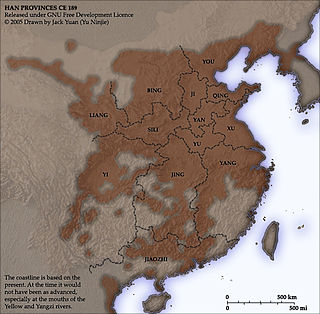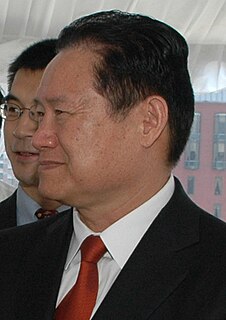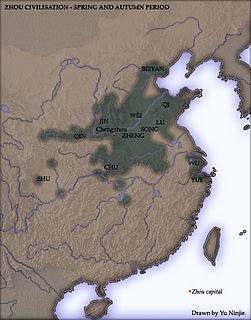The 7th century BC began the first day of 700 BC and ended the last day of 601 BC.

The Zhou dynasty was a Chinese dynasty that followed the Shang dynasty and preceded the Qin dynasty. The Zhou dynasty lasted longer than any other dynasty in Chinese history. The military control of China by the royal house, surnamed Ji, lasted initially from 1046 until 771 BC for a period known as the Western Zhou and the political sphere of influence it created continued well into Eastern Zhou for another 500 years.

Zhou Enlai was the first Premier of the People's Republic of China. Zhou was China's head of government, serving from October 1949 until his death in January 1976. Zhou served under Chairman Mao Zedong and was instrumental in the Communist Party's rise to power, and later in consolidating its control, forming foreign policy, and developing the Chinese economy.

The Spring and Autumn period was a period in Chinese history from approximately 771 to 476 BC which corresponds roughly to the first half of the Eastern Zhou Period. The period's name derives from the Spring and Autumn Annals, a chronicle of the state of Lu between 722 and 479 BC, which tradition associates with Confucius.

The Warring States period was an era in ancient Chinese history characterized by warfare, as well as bureaucratic and military reforms and consolidation. It followed the Spring and Autumn period and concluded with the Qin wars of conquest that saw the annexation of all other contender states, which ultimately led to the Qin state's victory in 221 BC as the first unified Chinese empire, known as the Qin dynasty. Although different scholars point toward different dates ranging from 481 BC to 403 BC as the true beginning of the Warring States, Sima Qian's choice of 475 BC is the most often cited. The Warring States era also overlaps with the second half of the Eastern Zhou dynasty, though the Chinese sovereign, known as the king of Zhou, ruled merely as a figurehead and served as a backdrop against the machinations of the warring states.

The Western Zhou was the first half of the Zhou dynasty of ancient China. It began when King Wu of Zhou overthrew the Shang dynasty at the Battle of Muye and ended when the Quanrong nomads sacked its capital Haojing and killed King You of Zhou in 771 BC.

Zhou Tai, courtesy name Youping, was a military general serving under the warlord Sun Quan during the late Eastern Han dynasty and early Three Kingdoms period of China. He previously served under Sun Ce, Sun Quan's elder brother and predecessor.

Zhou Yu (175–210), courtesy name Gongjin, was a military general and strategist serving under the warlord Sun Ce in the late Eastern Han dynasty of China. After Sun Ce died in the year 200, he continued serving under Sun Quan, Sun Ce's younger brother and successor. Zhou Yu is primarily known for his leading role in defeating the numerically superior forces of the northern warlord Cao Cao at the Battle of Red Cliffs in late 208, and again at the Battle of Jiangling in the same year. Zhou Yu's victories served as the rockbed of Sun Quan's regime, which in 222 became Eastern Wu, one of the Three Kingdoms. Zhou Yu did not live to see Sun Quan's enthronement, however, as he died at the age of 35 in 210 while preparing to invade Yi Province. According to the Records of the Three Kingdoms, Zhou Yu was described as physically strong and having a beautiful appearance. He was also referred to as "Zhou the Youth". However, his popular moniker "Zhou the Youthful Beauty" does not appear in either the Records or the 14th-century historical novel Romance of the Three Kingdoms. Some Japanese literary scholars such as Yoshikawa Eiji and Koide Fumihiko believe that this was a later invention by Japanese storytellers.
King Wu of Zhou was the first king of the Zhou dynasty of ancient China. The chronology of his reign is disputed but is generally thought to have begun around 1046 BC and ended three years later in 1043 BC.

Chinese bronze inscriptions, also commonly referred to as Bronze script or Bronzeware script, are writing in a variety of Chinese scripts on Chinese ritual bronzes such as zhōng bells and dǐng tripodal cauldrons from the Shang dynasty to the Zhou dynasty and even later. Early bronze inscriptions were almost always cast, while later inscriptions were often engraved after the bronze was cast. The bronze inscriptions are one of the earliest scripts in the Chinese family of scripts, preceded by the oracle bone script.

Zhou were historical political divisions of China. Formally established during the Han dynasty, zhou exist continuously until the establishment of the Republic of China in 1912—a period of over 2000 years. Zhou were also previously used in Korea, Vietnam, and Japan.

Zhou Yongkang is a former senior leader of the Communist Party of China (CPC). He was a member of the 17th Politburo Standing Committee (PSC), China's highest decision-making body, and the Secretary of the Central Political and Legal Affairs Commission (Zhengfawei) between 2007 and 2012, making him the 3rd most powerful politician in China. In that position, Zhou oversaw China's security apparatus and law enforcement institutions, with power stretching into courts, prosecution agencies, police forces, paramilitary forces, and intelligence organs. He was convicted of corruption-related charges in 2014 and expelled from the CPC.

The Northern Zhou followed the Western Wei, and ruled northern China from 557 to 581 AD. The last of the Northern Dynasties of China's Northern and Southern dynasties period, it was eventually overthrown by the Sui Dynasty. Like the preceding Western and Northern Wei dynasties, the Northern Zhou were members of the Tuoba clan of the Xianbei.

Zhou Tong was the archery teacher and second military arts tutor of famous Song Dynasty general Yue Fei. Originally a local hero from Henan, he was hired to continue Yue Fei's military training in archery after the boy had rapidly mastered spearplay under his first teacher. In addition to the future general, Zhou accepted other children as archery pupils. During his tutelage, Zhou taught the children all of his skills and even rewarded Yue with his two favorite bows because he was his best pupil. After Zhou's death, Yue would regularly visit his tomb twice a month and perform unorthodox sacrifices that far surpassed that done for even beloved tutors. Yue later taught what he had learned from Zhou to his soldiers and they were successful in battle.

Zhou Xun is a Chinese actress and singer. She is regarded as one of the Four Dan Actresses of China. She gained international fame for her roles in Suzhou River (2000) and Balzac and the Little Chinese Seamstress (2002).

Zhōu is the Hanyu Pinyin transliteration of the Chinese family name 周, which now ranks as the 10th most common surname in Mainland China, and 71st in South Korea. It has been one of the ten most common surnames in China since the Yuan Dynasty.
Zhou Xin was an official who lived during the late Eastern Han dynasty of China.

The I Ching or Yi Jing, also known as Classic of Changes or Book of Changes, is an ancient Chinese divination text and the oldest of the Chinese classics. Possessing a history of more than two and a half millennia of commentary and interpretation, the I Ching is an influential text read throughout the world, providing inspiration to the worlds of religion, psychoanalysis, literature, and art. Originally a divination manual in the Western Zhou period (1000–750 BC), over the course of the Warring States period and early imperial period (500–200 BC) it was transformed into a cosmological text with a series of philosophical commentaries known as the "Ten Wings". After becoming part of the Five Classics in the 2nd century BC, the I Ching was the subject of scholarly commentary and the basis for divination practice for centuries across the Far East, and eventually took on an influential role in Western understanding of Eastern thought.
Zhou Benshun is a former Chinese politician. Between 2013 and 2015, he served as the Communist Party Secretary and the top official of Hebei Province. Prior to his post in Hebei, Zhou Benshun was the Secretary-General of the Central Political and Legal Affairs Commission, serving under disgraced domestic security chief Zhou Yongkang.

The Eastern Zhou was the second half of the Zhou dynasty of ancient China. It is divided into two periods: the Spring and Autumn and the Warring States.
















